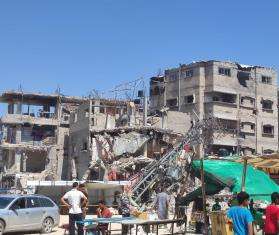GENEVA, SWITZERLAND—The international medical humanitarian organization Doctors Without Borders/Médecins Sans Frontières (MSF) today confirmed that five of its staff members held in Syria have been safely released. The organization strongly condemns this abduction, which has forced the permanent closure of one of its hospitals and two health centers in the Jabal Akkrad region in northwestern Syria.
On January 2, 2014, five MSF staff members were taken by an armed group in northern Syria, where they were working in an MSF-run hospital to provide essential healthcare to people affected by the conflict. Three of the staff members were released on April 4. Two returned on May 14 and are on their way to be reunited with their families.
“The relief of seeing our colleagues return safely is mixed with anger in the face of this cynical act that has cut off an already war ravaged population from desperately needed assistance,” said Joanne Liu, MSF international president. “The direct consequence of taking humanitarian staff is a reduction in lifesaving aid. The long-term victims of this abduction are the Syrian population. Some 150,000 people in the Jabal Akkrad region are now deprived of MSF’s medical care, while living in a war zone.”
In 2013, MSF medical staff in the now-closed facilities performed 521 surgical operations, many for trauma wounds, 36,294 medical consultations, and safe hospital deliveries for more than 400 mothers.
Across northern Syria, where MSF continues to operate other medical facilities, security constraints have made it extremely challenging to provide assistance. Medical facilities have been attacked and bombed, and health workers killed or threatened by armed groups. Elsewhere in Syria, denial of official access and insecurity have blocked MSF from setting up medical activities.
“This incident is representative of the complete disregard shown toward civilians throughout Syria today,” said Liu. “While millions of Syrians need assistance for their survival, the very idea of an independent humanitarian presence is rejected among some of the armed parties to the war. We should be running some of the largest medical programs in MSF’s 40-year history, in line with the massive needs of the Syrian people. But in the current environment our capacity to respond is painfully limited.”
MSF would like to thank everyone for the support and solidarity shown to our colleagues and their families, and it is grateful to the media for its understanding during these difficult months. We ask the public and the media to maintain the same consideration now that our colleagues have returned.
Out of respect for the privacy of the five individuals, MSF is neither disclosing their identities nor commenting further on the circumstances of their captivity or release.
Since June 2012, MSF has been operating makeshift hospitals and health centers across northern Syria. These facilities have provided more than 7,000 surgeries, 53,000 emergency room interventions, 88,000 out-patient consultations, and more than 2,000 safe deliveries. A network of 50 hospitals and 80 health centers run by Syrian medical networks is supported across seven governorates. In Iraq, Jordan and Lebanon, MSF operates large programs providing medical assistance to Syrian refugees, where nearly 400,000 consultations have been provided.





